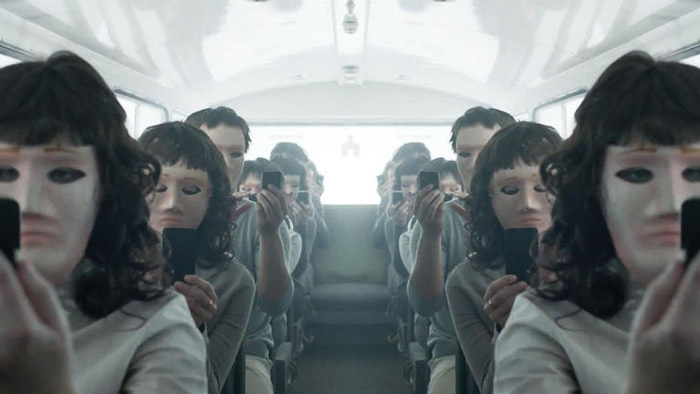“The world itself is just one big hoax,” protagonist Elliot Alderson says in the pilot episode of Mr. Robot. This summer’s critical darling, the show tells the story of Alderson, a socially-awkward, morphine-addicted hacker extraordinaire. Alderson looks at his world and sees an obvious problem: Much of it appears to be in the hands of corporations—namely the monopolistic “E-corp” (referred to by Alderson and others as “Evil Corp” throughout the show). Like any responsible hacker, he teams up with the hacktivist group “fsociety” in order to sabotage Evil Corp’s electronic records and revert all personal debt to zero.
Rami Malek shines as Alderson, who, despite his rather by-the-numbers character description, comes off as a distinct and memorable protagonist. In many ways, the show is at its best when it stops preaching about corporate greed and instead focuses on Anderson. Malek plays the character with such pathos and loneliness that it’s hard to look away.
The show’s anti-corporate zeal is well-trodden territory. That’s not to say that it isn’t well done; the aesthetic and narrative of Mr. Robot owes a great deal to Fight Club (1999), a biting satire on consumerism in its own right; however, the show generally portrays the head honchos of Evil Corp as cartoonishly evil caricatures. Tyrell Wellick (Martin Wallstrom), an ambitious middle-manager, is a notable exception not because he’s any less evil, but because he’s more interesting—equal parts Frank Underwood and Patrick Bateman. The other executives paint a clear, unambiguous portrait of good and evil. Corporations are bad, end of story.
This leads to the one question that is left unanswered in shows like Mr. Robot or movies like Fight Club: After the technocracy comes crumbling down and the debts have been cleared, what’s next? After all, the increasing concentration of political power in the hands of the rich is well documented. Anyone can look at the Citizens United ruling or the widening gap between the rich and poor and get a good grasp of the way society is heading. It’s harder to admit that it may be as much our fault as corporations.
Perhaps this answer-seeking is unwarranted. Anderson concludes one of his better monologues with “it’s painful not to pretend, because we’re cowards.” Fight Club’s Tyler Durden captured the predicament of the middle-class worker perfectly, saying “we’re slaves with white collars, working jobs we hate to buy shit we don’t need.” As Wellick and Anderson progress, both protagonists tends to forget these concerns, and instead, focus on their main objective—taking down the big, bad corporations, the symptom of a greater societal disease.
Enter Black Mirror (2011). Charlie Brooker’s cynical, sci-fi satire is the best commentary on consumerism and technology on television. Unfortunately, it’s not on television very often, with only seven excellent episodes to its name since its launch in 2011. Rather than forming a consistent narrative, each episode provides a stand-alone glimpse into the society of the near future. Its characters are not Wall Street capitalists, nor are they revolutionaries. Instead, they are ordinary people, living in a society that is already far out of their reach. One tragically absurd episode features a cynical comedian who decides to run for office as a foul-mouthed animated bear named Waldo as a joke. People have lost such faith in the politicians that Waldo the Bear is able to mount a considerable challenge to the other candidates. Another episode features a device called a “grain,” which records its owner’s every action for replay at a later time. To viewers’ horror, they witness a couple’s domestic troubles spiral out of control as the device eradicates any trust they had in each other.
What Black Mirror understands that Mr. Robot and Fight Club don’t is that in a world of distractions, technology and consumption have not only shaped political and economic relationships between people, but also personal relationships. Society is at the point in which identities are self-consciously constructed on social networks every day; where a conversation with someone across the world is just a click away, but something as simple as knowing the next-door neighbours is often neglected. This hasn’t been forced on us. We chose Candy Crush and Snapchat. Perhaps then, instead of asking, “How do we destroy this world?” The question at hand should be, “why did we create it in the first place?”









